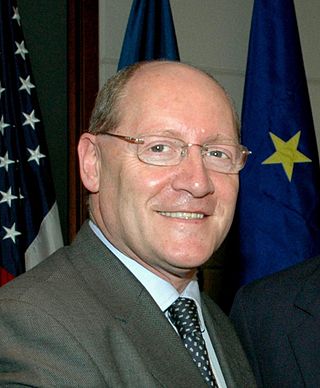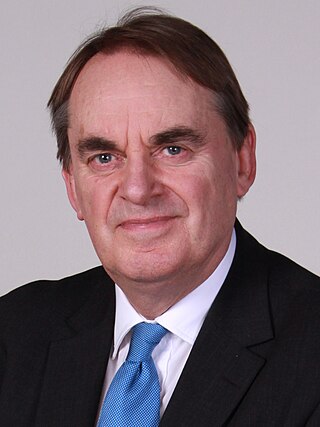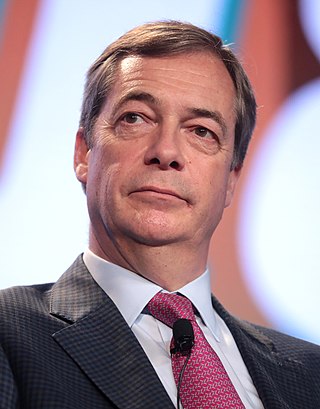Related Research Articles

The politics of the United Kingdom functions within a constitutional monarchy where executive power is delegated by legislation and social conventions to a unitary parliamentary democracy. From this a hereditary monarch, currently King Charles III, serves as head of state while the Prime Minister of the United Kingdom, currently Rishi Sunak since 2022, serves as the elected head of government.

The Scottish Parliament is the devolved, unicameral legislature of Scotland. Located in the Holyrood area of the capital city, Edinburgh, it is frequently referred to by the metonym Holyrood. The Parliament is a democratically elected body comprising 129 members known as Members of the Scottish Parliament (MSPs), elected for five-year terms under the regionalised form of additional member system (MMP): 73 MSPs represent individual geographical constituencies elected by the plurality (first-past-the-post) system, while a further 56 are returned as list members from eight additional member regions. Each region elects seven party-list MSPs. Each region elects 15 to 17 MSPs in total. The most recent general election to the Parliament was held on 6 May 2021, with the Scottish National Party winning a plurality.

The politics of Scotland operate within the constitution of the United Kingdom, of which Scotland is a country. Scotland is a democracy, being represented in both the Scottish Parliament and the Parliament of the United Kingdom since the Scotland Act 1998. Most executive power is exercised by the Scottish Government, led by the First Minister of Scotland, the head of government in a multi-party system. The judiciary of Scotland, dealing with Scots law, is independent of the legislature and the Scottish Government. Scots law is primarily determined by the Scottish Parliament. The Scottish Government shares some executive powers with the Scotland Office, a British government department led by the Secretary of State for Scotland.

The 1989 European Parliament election, was the third European election to be held in the United Kingdom. It was held on 15 June. The electoral system was First Past the Post in England, Scotland and Wales and Single Transferable Vote in Northern Ireland. The turnout was again the lowest in Europe.

The 1994 European Parliament election was the fourth European election to be held in the United Kingdom. It was held on Thursday 9 June, though, as usual, the ballots were not counted until the evening of Sunday 12 June. The electoral system was, for the final European election, first past the post in England, Scotland and Wales and single transferable vote in Northern Ireland. This was the first election with 87 MEPs, the European Parliamentary Elections Act 1993 having increased the number of seats for the UK from 81. For the first time, the UK did not have the lowest turnout in Europe. Turnout was lower in the Netherlands and Portugal.

The 1999 European Parliament election was the United Kingdom's part of the European Parliament election 1999. It was held on 10 June 1999. Following the European Parliamentary Elections Act 1999, it was the first European election to be held in the United Kingdom where the whole country used a system of proportional representation. In total, 87 Members of the European Parliament were elected from the United Kingdom across twelve new regional constituencies.

The 2004 European Parliament election was the United Kingdom's part of the wider 2004 European Parliament election which was held between 10 and 13 June 2004 in the 25 member states of the European Union. The United Kingdom's part of this election was held on Thursday 10 June 2004. The election also coincided with the 2004 local elections and the London Assembly and mayoral elections. In total, 78 Members of the European Parliament were elected from the United Kingdom using proportional representation.

The Scottish Conservative & Unionist Party is part of the Conservative Party (UK) active in Scotland. It is a centre-right to right-wing, conservative political party. The party's policies in Scotland usually promote conservatism and the continuing of Scotland as constituent country of the United Kingdom. It holds 7 of the 59 Scottish seats in the House of Commons, 31 of the 129 seats in the Scottish Parliament, and comprises 209 of Scotland's 1,227 local councillors.

Scotland has elections to several bodies: the Scottish Parliament, the United Kingdom Parliament, local councils and community councils. Before the United Kingdom left the European Union, Scotland elected members to the European Parliament.
William John Allan Macartney was a Scottish politician who served as a Scottish National Party MEP for the North East Scotland constituency between the 1994 European Parliament election and his sudden death from a heart attack in 1998.

The 1980 Glasgow Central by-election was a by-election held on 26 June 1980 for the British House of Commons constituency of Glasgow Central, following the death of its sitting MP, Thomas McMillan.

The 2009 European Parliament election was the United Kingdom's component of the 2009 European Parliament election, the voting for which was held on Thursday 4 June 2009. The election was held concurrently with the 2009 local elections in England. In total, 72 Members of the European Parliament were elected from the United Kingdom using proportional representation.
The Kincardine and Deeside by-election was a parliamentary election held in Kincardine and Deeside, Scotland, on 7 November 1991, caused by the death of the Conservative Member of Parliament, Alick Buchanan-Smith on 29 August 1991.

Prior to its uniform adoption of proportional representation in 1999, the United Kingdom used first-past-the-post for the European elections in England, Scotland and Wales. The European Parliament constituencies used under that system were smaller than the later regional constituencies and only had one Member of the European Parliament each.

Prior to its uniform adoption of proportional representation in 1999, the United Kingdom used first-past-the-post for the European elections in England, Scotland and Wales. The European Parliament constituencies used under that system were smaller than the later regional constituencies and only had one Member of the European Parliament each.

Essex West and Hertfordshire East was a constituency of the European Parliament located in the United Kingdom, electing one Member of the European Parliament by the first-past-the-post electoral system. Created in 1994 from parts of Hertfordshire and Essex South West, it was abolished in 1999 on the adoption of proportional representation for European elections in England, Scotland and Wales. It was succeeded by the East of England region.

There are five types of elections in the United Kingdom: elections to the House of Commons of the United Kingdom, elections to devolved parliaments and assemblies, local elections, mayoral elections, and police and crime commissioner elections. Within each of those categories, there may also be by-elections. Elections are held on Election Day, which is conventionally a Thursday, and under the provisions of the Dissolution and Calling of Parliament Act 2022 the timing of general elections can be held at the discretion of the prime minister during any five-year period. All other types of elections are held after fixed periods, though early elections to the devolved assemblies and parliaments can occur in certain situations. The five electoral systems used are: the single member plurality system (first-past-the-post), the multi-member plurality, the single transferable vote, the additional member system, and the supplementary vote.

The 2014 European Parliament election was the United Kingdom's component of the 2014 European Parliament election, held on Thursday 22 May 2014, coinciding with the 2014 local elections in England and Northern Ireland. In total, 73 Members of the European Parliament were elected from the United Kingdom using proportional representation. England, Scotland and Wales use a closed-list party list system of PR, while Northern Ireland used the single transferable vote (STV).

The 2019 European Parliament election was the United Kingdom's component of the 2019 European Parliament election. It was held on Thursday 23 May 2019 and the results announced on Sunday 26 and Monday 27 May 2019, after all the other EU countries had voted. This was the United Kingdom's final participation in a European Parliament election before leaving the European Union on 31 January 2020, and was also the last election to be held under the provisions of the European Parliamentary Elections Act 2002 before its repeal under the European Union (Withdrawal) Act 2018.
This is an annotated list of notable records from United Kingdom elections to the European Parliament.
References
- ↑ Boothroyd, David (11 April 2003). "United Kingdom European Parliamentary Election results 1979-99: London". Election Demon. Archived from the original on 11 April 2003. Retrieved 27 January 2022.
- 1 2 3 United Kingdom Parliamentary Election results 1979-1999: England: Part 2
- ↑ United Kingdom Parliamentary Election results 1979-1999: England: Part 1
- ↑ Grice, Andrew (28 November 1998). "Politics: Euro Election: Woofie factor sees off Labour in Scots poll". The Independent . Retrieved 18 April 2017.
- ↑ United Kingdom Parliamentary Election results 1979-1999: Scotland
- ↑ "Dame Sheiagh Roberts." Times [London, England] 20 Jan. 1992: 14. The Times Digital Archive. Web. 31 May 2014.
- 1 2 3 4 5 6 Cracknell, Richard; Morgan, Bryn (2 June 1999). "European Parliament elections: 1979 to 1994". House of Commons Library. Retrieved 9 January 2024.